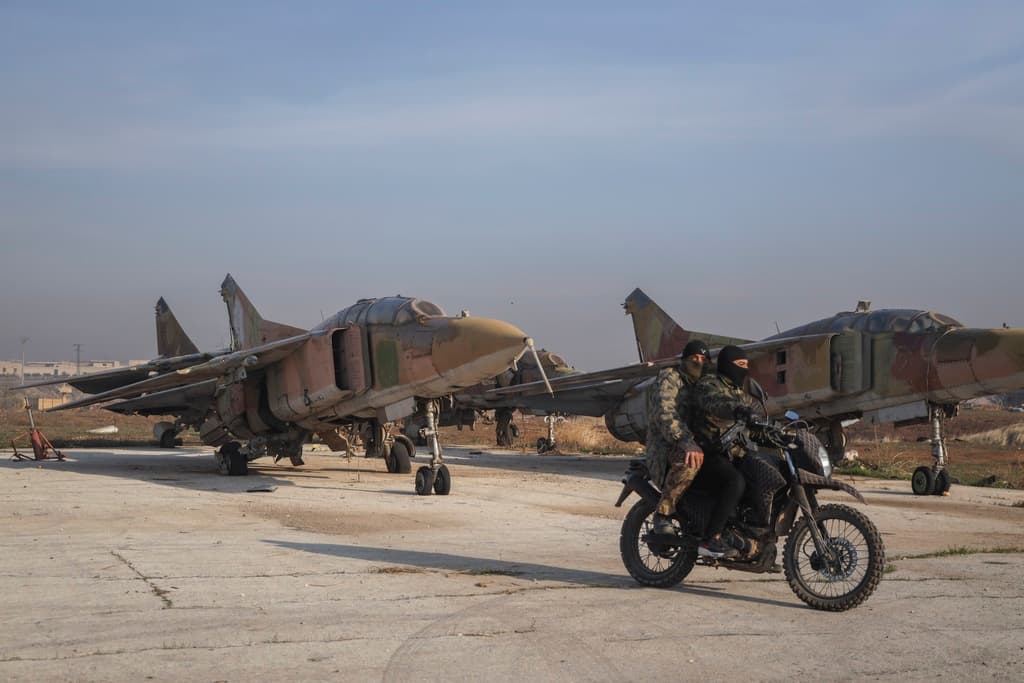Renewed Fighting in Syria Puts at Risk Trump’s Hope of Pacifying the Globe
Will the incoming president now keep in place the nearly 1,000 American troops that are stationed in Syria near areas controlled by the Kurds?

With the situation in Syria threatening to ignite a new, Mideast-wide burst of violence, will President-elect Trump be able to influence events in an area where too many players have stakes? Will he try?
Renewed fighting in a country that has maintained a tense status quo since 2017 involves numerous militias and state players. Yet, as a Syrian source characterizes it for the Sun, they can be reduced to three core groups: Sunni jihadists; Shiites and Alwites protecting President Assad; and Kurds.
The Sunnis are backed by Syria’s neighbor, Turkey, which is hoping to smash a Kurdish enclave in Syria. Mr. Assad is protected by Russia and the Islamic Republic of Iran, which is replacing Hezbollah’s Syrian fighters with proxy militias from Afghanistan, Pakistan, and Iraq.
The Syrian Kurds have been America’s strongest allies in the fight against ISIS, the jihadists that Trump often boasts of having brought down. Another of Trump’s first-term achievements, as he often said on the campaign trail, was a world at relative peace, in contrast with the global wars during his successor’s time in office.
Will the incoming president now keep in place the nearly 1,000 American troops that are stationed in Syria near areas controlled by the Kurds?
The answer is difficult to predict, as Trump’s “entire foreign policy is based on deterrence and unpredictability,” a vice president at the Foundation for Defense of Democracies, Jonathan Schanzer, tells the Sun. Yet, he points to several nominees to key foreign policy positions who are hawkish on Syria and who “will likely recommend staying the course.”
Those nominations include Representative Mike Waltz as national security adviser and Senator Rubio as secretary of state. Then again, Tulsi Gabbard, a former congresswoman designated by Trump as director of national intelligence, has met with, and praised, Mr. Assad. She could advocate removing American forces from Syria.
Also, Mr. Schanzer notes, “what we saw last time around is that advisors don’t necessarily stay for the long haul,” so the direction of Trump’s Syria policy may turn on what America realistically could do to influence the emerging chaos there.
In the past, “it behooved us to kind of identify whether there were any elements there within Syria fighting against Assad that we could work with,” Mr. Rubio told ABC News on Sunday. President Biden, though, “failed to do that, so now your options are quite limited. Now the strongest groups fighting against Assad, unfortunately, are al Qaeda-linked elements,” he said.
Yet, these jihadists now claim to have moderated their goals. Israel and America could encourage them “to move east, to the Deir a-Zour area,” a professor emeritus of Mideast studies at Haifa University, Amatzia Bar’am, tells the Sun. “That is where Iran transfers nearly 90 percent of the arms to Assad and to Hezbollah in Lebanon.”
Yet, Mr. Bar’am acknowledges that such a move carries possible complications, including the possibility that a group with a global jihadist background could get its hand on Mr. Assad’s chemical weapons. Also, he adds, “America must ensure the Kurds are unharmed” in eastern Syria, which could prove a tall order.
The Syria war was launched in 2012 at the height of the so-called Arab Spring. Hundreds of thousands were killed by the Damascus regime, while the anti-Assad rebellion transformed from a cry for democracy to a contest between various armed groups with extremist ideologies.
America’s “initial, fatal mistake” was President Obama’s reluctance to enforce his own red line on the use of chemical weapons in that conflict, an Iran researcher at Israel’s Misgav Institute, Yossi Mansharof, tells the Sun. “Now the Russians and Iranians are there,” as are the Turks, “and the West has little to do in Syria.”
Since 2017, an uneasy calm has taken over in Syria. Turkey-backed Sunnis and the Kurds are controlling parts of the country, while Mr. Assad has been able to regain some of the major cities, including the capital Damascus and Syria’s second-largest metropolis, Aleppo. That equilibrium was shattered over the weekend.
The lead Sunni group that captured Aleppo, calling itself Hayat Tahrir al-Sham, is fast gaining elsewhere. Known earlier as al-Nousra front, its leader, Abu Mohammed al-Golani, recently pronounced himself a Syrian national and renounced al Qaeda ties and the global jihadist movement. He now claims to fight only for the fall of Mr. Assad’s regime.
His latest successes are well-timed. Mr. Assad’s top protectors are spending resources elsewhere. War with Israel has weakened Iran and its top proxy, Hezbollah. Mr. Assad’s other powerful ally, Russia, is busy in Ukraine.
“Russia is helping” in a fight against “the terrorists” in Syria, Moscow’s deputy ambassador at the United Nations, Dmitry Polyansky, tells the Sun. The Russian and Syrian air forces are reportedly pummeling Aleppo indiscriminately in an attempt to reverse the jihadists’ gains.
Pressures from multiple sides could entice Trump to heed calls to wash his hands of Syria. Yet, as a near-dormant war reignites, it could inflame the entire region, risking the incoming president’s hopes of pacifying the world.

